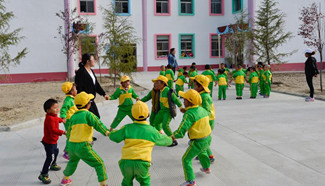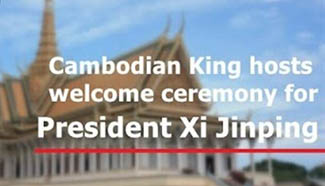by Xinhua writer Gu Zhenqiu
UNITED NATIONS, Oct. 13 (Xinhua) -- The UN General Assembly on Thursday appointed by acclamation Antonio Guterres, the former Portuguese prime minister and former head of the UN refugee agency, as the secretary-general of the United Nations to replace Ban Ki-moon, who is to leave on Dec. 31 at the end of his two five-year terms.
The sustained standing ovation from the 193 member states showed their unity and consensus in supporting the 67-year-old Guterres, a unanimous choice by the 15-member UN Security Council, which recommended him for the role of the world's top diplomat.
The speech by the secretary-general-designate at the General Assembly hall revealed clues to his top priority when he assumes his office on Jan. 1, 2017.
Peace, justice, human dignity, tolerance and solidarity are among his top priorities as the next secretary-general, his speech revealed as he said "I am fully aware of the challenges of the UN faces and the limitations surrounding the secretary-general."
"Without peace, life is devoid of all its meaning," he said.
"Based on these values, I believe that diversity in all its forms is a tremendous asset, and not a threat; that in societies that are more and more multi-ethnic, multi-cultural and multi-religious, diversity can bring us together, not drive us apart," he said.
As he was speaking, the guns of war were still being heard in such countries as Syria, Yemen, Mali, South Sudan while women and girls remain marginalized in their societies. The unfair international political and economic order still prevails in today's world as the gap between rich and poor nations is widening.
Guterres said that he is looking forward to working with all UN member states as "the secretary-general alone neither has all the answers (to the dramatic problems of today's complex world), nor seeks to impose his views."
As secretary-general, Guterres said that he is ready to make his good offices available, "working as a convener, mediator, a bridge-builder and an honest broker to help find solutions that benefit everyone involved."
At the same time, gender equality is also expected to be among his top priorities. "I have long been aware of the hurdles women face in society, in the family and in the workplace just because of their gender," he said. "The protection and the empowerment of women and girls will continue to be a priority commitment for me."
Besides, he said, "I will do my utmost to honor" the legacy of UN Secretary-General Ban Ki-moon, who has been tirelessly working to promote sustainable development and tackle climate change.
From now on until his assumption of his new post, Guterres, who also served as UN refugee chief for a decade until last December, is expected to have wide consultations with UN member states to fine tune his top priorities.
The UN Charter describes the secretary-general as "chief administrative officer" of the world body, who acts in that capacity and performs such other functions as are entrusted to him by the Security Council, General Assembly, the Economic and Social Council and other UN organs.
The Charter also empowers the secretary-general to bring to the attention of the Security Council, the most powerful UN body, any matter which might threaten the maintenance of international peace and security.
The new secretary-general would fail if he did not take careful account of the needs and concerns of individual member states, but he would also be remiss if he did not uphold the values and moral authority of the United Nations, and speak and act independently for peace -- even at the risk of challenging or disagreeing with those same member states.
At the moment, Guterres enjoys unanimous support from the Security Council and General Assembly. The Security Council nominated Guterres by acclamation last week after its sixth informal poll. He topped all the six straw polls, which included a total of 13 candidates -- seven women and six men.
Apart from wide endorsement, acclamation at the Security Council and then the General Assembly also mirrored high expectations from the international community.
"As secretary-general, having been chosen by all member states, I must be at the service of them all equally and with no agenda but the one enshrined in the UN Charter," he added.










